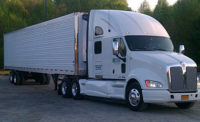Survey shows how fleets lack access to business intelligence
Approximately 33% of respondents said they still do not have a software platform that allows them to manage their fleet’s total cost of ownership all in one place.

Fleet Advantage, Fort Lauderdale, Fla., announced results of its latest industry-wide survey addressing the gap that remains for today’s fleets in the way they utilize data and business intelligence to run their trucks and fleet operations.
There are still fleets today that aren’t leveraging data to see their Total Cost of Ownership (TCO), many can’t use the data because it lives in disparate sources and others have no way of sharing reports across the organization.
The online survey was presented to more than 2,000 fleet executives in April. While Big Data has been increasingly utilized across virtually every industry, approximately 33% of respondents said they still do not have a software platform that allows them to manage their fleet’s TCO all in one place.
Meanwhile, a quarter of fleet executives (26%) said their current software analysis platform does not combine financial and operations data together, another 48% said their current platform does not provide benchmarking reports for the industry or other similar fleets and approximately 62% said their platform does not or they’re unsure if it produces a P&L statement for each truck in their fleet.
Regarding data that fleets are receiving from their trucks, roughly a third (30%) said they do not have easy access to reporting and analysis of this data. This is critical since 80% of respondents agree that access to better reporting in an easy-to-use fashion would lead to better decision-making for their fleets.
Many fleet executives are still unable to share critical data and information across the organization. More than a quarter (28%) said their fleet management resource does not provide executive summaries that can be shared with others, and another 14% said they don’t have the functionality to provide such reports from one simple, easy-to-use tool.
“What this survey shows is that many fleet executives today are still lacking access to a complete picture of data and analysis from sophisticated business intelligence tools that help everyone across the organization make critical decisions to operate more efficiently and lower bottom line costs,” says Jim Griffin, chief operations officer and chief technology officer.
Looking for a reprint of this article?
From high-res PDFs to custom plaques, order your copy today!






